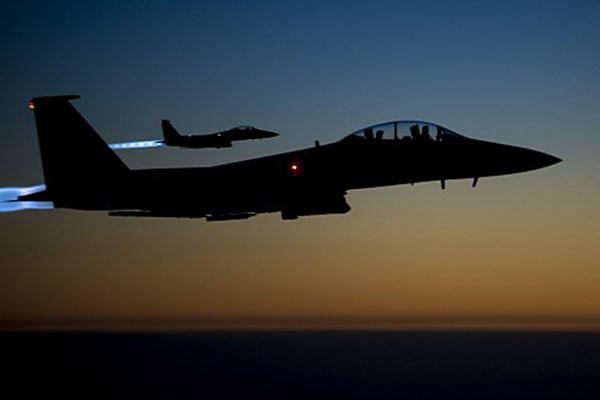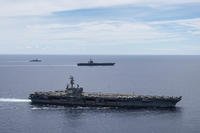U.S. warplanes carried out airstrikes around Mosul on Monday in the intensifying effort to set conditions for retaking the ISIS stronghold in northwestern Iraq as part of the overall effort to defeat the terror group that has cost at least $6.5 billion, the U.S. military said.
Attack and fighter aircraft carried out four strikes near Mosul, hitting a headquarters and a tactical unit, destroying an assembly area and suppressing a mortar unit of the Islamic State in Iraq and Syria, or ISIS, according to a statement from Combined Joint Task Force-Operation Inherent Resolve.
Six other strikes were conducted in Iraq, including one near Sinjar west of Mosul that hit an ISIS tactical unit and destroyed a heavy machine gun position, the task force said. U.S. and coalition manned aircraft and drones also conducted four strikes in Syria.
The latest strikes marked the third consecutive day of air operations in which the U.S. and the coalition carried out a total of 10 strikes in Syria and 51 in Iraq, including 12 around Mosul against the militant group
Since air operations began on Aug. 8, 2014, the U.S. and the coalition through the end of February had conducted a total of 10,962 strikes, including 7,336 in Iraq and 3,626 in Syria, according to the task force. The total cost of the military operation through February was $6.5 billion, or about $11.4 million daily.
Defense Secretary Ashton Carter and Joint Chiefs Chairman Marine Gen. Joseph Dunford have highlighted the campaigns to retake Mosul and Raqqa, the self-proclaimed ISIS capital in northeastern Syria as key to the ultimate defeat of the insurgency.
Last Friday, Carter and Dunford said they were pressing President Barack Obama to approve sending more troops to Iraq in the effort to accelerate the campaign following the March 22 Brussels attacks claimed by ISIS that killed at least 35 and wounded more than 270. An American airman and his family were among those injured in the bombings.
Dunford said that the campaign against ISIS was "gathering momentum" while critics of the strategy, which relies on U.S. support for local forces on the ground, said that the Brussels attacks showed that the ISIS threat had spread beyond Iraq and Syria.
Defense Department, State Department and White House officials have stated that the campaign against ISIS has made steady progress in the past year, noting that ISIS has lost about 40 percent of the territory it once held since the invasion of Iraq in the spring of 2014.
The first major setback for ISIS came in January 2015 when Kurdish forces pushed ISIS fighters out of the town of Kobane on the Turkish border in Syria. In March, Iraqi Security Forces, after several failed attempts, finally took Tikrit, hometown of the late dictator Saddam Hussein. In June, Syrian Kurds took the town of Tal Abyad controlling a supply route between Raqqa and Mosul.
In November, Iraqi Kurds backed by U.S. airstrikes retook Sinjar in northwestern and in December, ISIS suffered its biggest defeat in Iraq thus far with the fall of Ramadi, capital of Anbar province, to Iraqi forces.
-- Richard Sisk can be reached at Richard.Sisk@Military.com.































